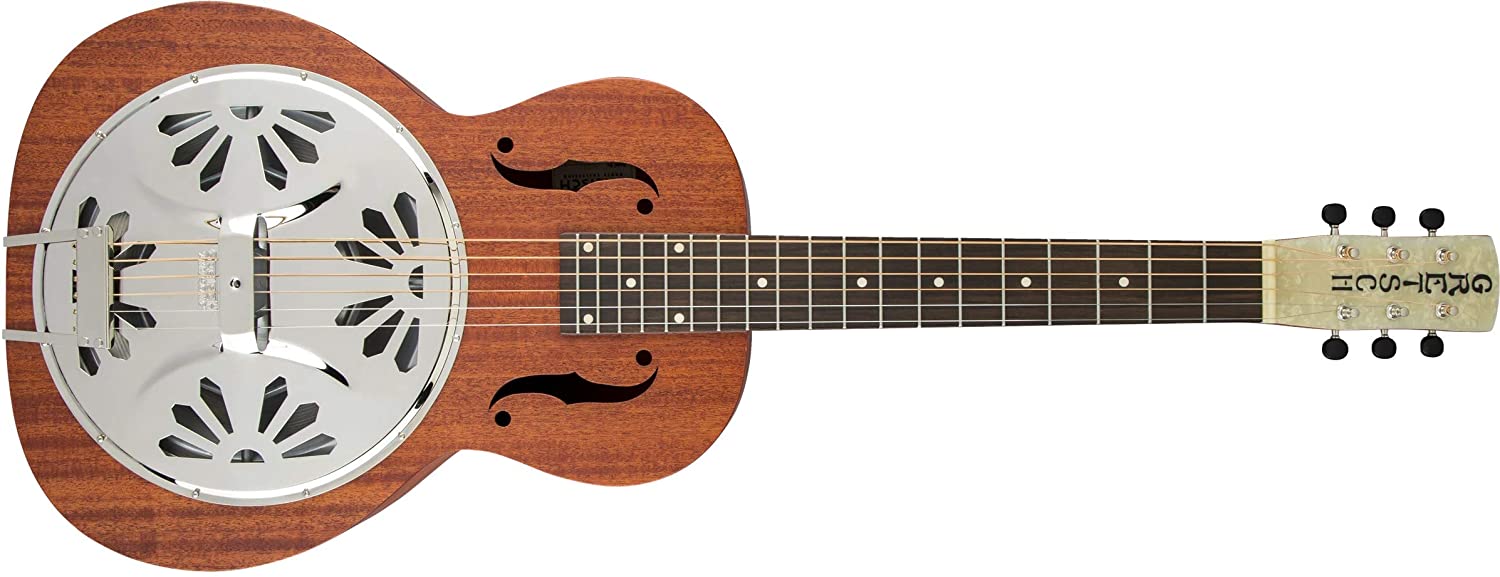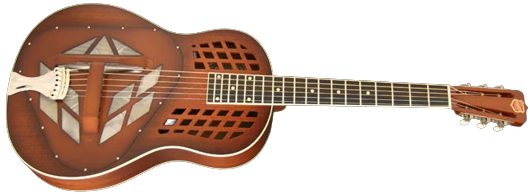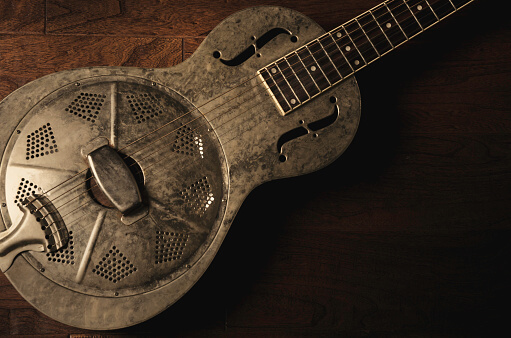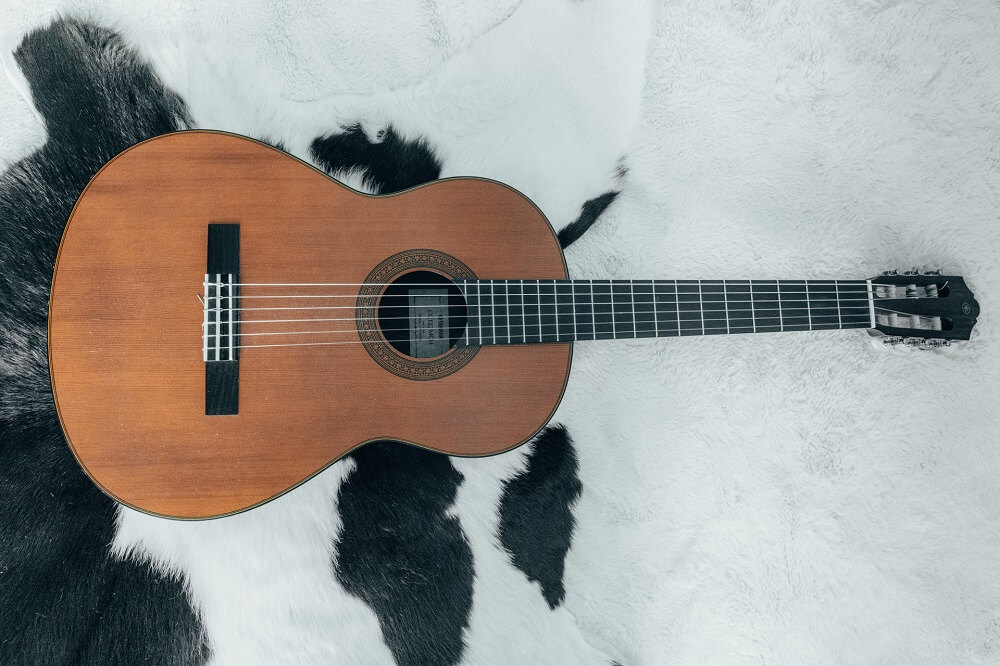Have you ever seen a resonator guitar and wondered how it works?
They look a little bit different than your standard acoustic guitar, and the sound they produce is unique, too.
Acoustic guitars have a soundhole in the body that amplifies the sound of the strings.
Resonator guitars, on the other hand, have a metal cone attached to the body that helps amplify the sound.
The metal cone can be made of different materials, but it is typically made of brass or steel.
In this blog post, we’ll take a closer look at resonator guitars and find out how they create that distinct sound.
Keep reading to learn more!
Table of Contents
How does a resonator guitar work?
A resonator guitar has a metal cone attached to the body. This helps amplify the sound of the strings.
As we previously mentioned, the metal cone can be made of different materials, but it is typically made of brass or steel.
The cone amplifies the sound by vibrating along with the strings.

Source: Amazon.com
This gives the guitar its characteristic “twangy” sound.
Resonator guitars were first developed in the 1920s; they were originally designed to be played with a slide, which is why they are sometimes called “slide guitars.”
Nowadays, you can play a resonator guitar with your fingers like any other guitar.
What are resonator guitars good for?
Resonator guitars are often used in blues and country music, but they are also popular among slide guitar players.
If you’re looking for a guitar with a unique sound, then a resonator guitar might be the right choice.
Their sound is characterized as “twangy,” which some people love and others find to be a bit harsh.
They’re good for adding a bit of country flavor to your music, or for giving your blues playing a more authentic sound.
For live performers, resonator guitars are also a good choice because they can be heard over a loud band and they look good.
If you’re someone who likes to be different and stand out from the crowd, then a resonator guitar is a great option.
I encourage you to watch this YouTube video by Justin Johnson in which he plays some dark swamp blues on the Dobro Duolian resonator guitar:
If you find it hard to come up with ways of using a resonator guitar in your music, this video should serve you as an example of the multiple ways to incorporate and play this instrument in a genre.
What is the difference between a Dobro and a resonator guitar?
The Dobro was the third resonator guitar designed by John Dopyera, the inventor of the resonator guitar, but the second to enter production
Dobro is a brand and also a design name for one of the most popular resonator guitars that were first introduced in the 1930s.
Resonator guitars are any type of guitar that has a resonator cone.
So, all Dobro guitars are resonator guitars, but not all resonator guitars are Dobro guitars.
As a brand, Dobro is currently owned by Gibson and manufactured by its subsidiary Epiphone, so you’ll mostly see these two companies using this term.
The main difference between the two is that Dobro guitars are only made by the Dobro company and its parent companies, whereas any resonator guitar, can be made by any guitar company.
What is a good resonator guitar for beginners?
There are a few good options for beginner resonator guitarists, one option is the Epiphone Dobro Hound Dog Round Neck Resonator Guitar.
This guitar just like its name implies has a single cone design and a round body, which makes it a good choice for beginners.
Another option is the National M-1 Tricone Resonator Guitar.

This guitar has a vintage style and a single cone design, which makes it a good choice for beginners.
It features a mahogany body, Ivoroid body and fingerboard binding, and a mahogany neck.
Aside from that, it also has a Satin polyester finish, a slotted headstock, and an ebony material fretboard.
Whatever guitar you choose, make sure you get one that’s the right size for you and that you feel comfortable playing.
Also, it’s always good to play and buy these guitars at a local store before ordering them online.
Things to keep in mind when buying a resonator guitar
-
Size
When you’re shopping for a resonator guitar, it’s important to keep in mind that they come in different sizes.
The size of the guitar will affect the sound it produces!
If you’re not sure which size you want, it’s a good idea to try out different sizes before purchasing.
Usually, they come and follow the same size standards as acoustic guitars, for example, concert, full size, half size, and 3/4 size.
-
Design
Another thing to keep in mind is that resonator guitars come in different designs, some have a single metal cone, while others have multiple cones.
The differences will be subtle, but it’s worth considering which design you prefer before making a purchase.
There are also resonator guitars with wooden bodies and those with metal bodies.
-
Price
Of course, price is also an important consideration when shopping for a resonator guitar.
Most resonator guitars can range in price from a few hundred dollars to several thousand dollars.
It’s important to set a budget before you start shopping so that you don’t overspend.
-
Quality
When you’re shopping for a resonator guitar, it’s important to choose a guitar that is made from high-quality materials.
The better the quality of the guitar, the longer it will last and the better it will sound.
Of course, this will directly affect the price of the guitar, but as with all instruments, you get what you pay for.
-
Brand
There are many different brands of resonator guitars on the market, so it’s important to do your research and find a brand that you trust.
On the other hand, there are many online reviews of resonator guitars that can help you narrow down your choices.
Some popular brands include:
- Dobro
- National
- Gibson
- Epiphone
- Gretsch.
How hard is it to learn to play a resonator guitar?
Learning to play a resonator guitar is not difficult, but it does take some practice, if you’re a beginner, it’s a good idea to start by learning the basic chords.
Once you know how to play chords on a regular guitar, you can start practicing songs on any resonator guitar.
There are many instructional books and online lessons available to help you learn to play the resonator guitar.
Once you get the hang of it, you’ll be able to play any song you want.
It goes without saying that if you already know how to play the guitar, learning to play a resonator guitar will be much easier.
But even if you’re starting from scratch, you’ll be able to learn how to play this type of guitar with some practice.
The feel and playability although a bit different it’s still fairly the same as with any other acoustic guitar, of course, the sound, weight, and projection will all be very noticeable.

More than 10 years of experience playing and writing about guitars! When not writing, I can be found strumming away some Johnny Cash tunes. Favorite all time guitar is the Gibson Les Paul. #TeamGibson




